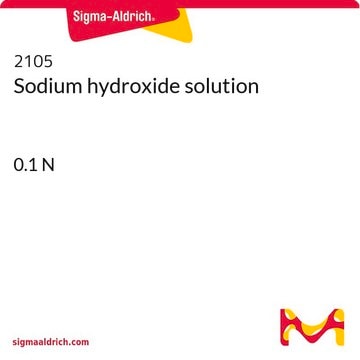1.09141
Sodium hydroxide solution
c(NaOH) = 0.1 mol/l (0.1 N), reag. Ph. Eur., reag. USP, ready-to-use volumetric solution for titration, Titriplex®
About This Item
Doporučené produkty
product name
Sodium hydroxide solution, c(NaOH) = 0.1 mol/l (0.1 N), Titripur®, reag. Ph. Eur., reag. USP
agency
reag. Ph. Eur.
reag. USP
Quality Level
vapor pressure
3 mmHg ( 37 °C)
product line
Titripur®
form
liquid
quality
Analyzed in our ISO 17025 accredited QC lab
reaction suitability
reaction type: Acid-base reactions
packaging
Titripac® of
concentration
0.1 M
technique(s)
titration: suitable
pH
12.7 (20 °C in H2O)
density
1.00 g/cm3 at 20 °C
storage temp.
15-25°C
SMILES string
[OH-].[Na+]
InChI
1S/Na.H2O/h;1H2/q+1;/p-1
InChI key
HEMHJVSKTPXQMS-UHFFFAOYSA-M
Hledáte podobné produkty? Navštivte Průvodce porovnáváním produktů
Související kategorie
Application
- Adsorption Studies: Sodium hydroxide solution is used in treating polymer adsorbents to enhance their adsorption properties. A recent study investigated the effect of treating a PVC/Aliquat-336 polymer adsorbent with sodium hydroxide on chromium (VI) adsorption. The treatment improved the adsorption capacity of the polymer, making it more effective in removing heavy metals from aqueous solutions (Ouazine et al., International Journal of Environmental Analytical Chemistry, 2022).
- Synthesis of Sodium Ethoxide: Sodium hydroxide solution is employed in the synthesis of sodium ethoxide, an important reagent in organic synthesis. Research has demonstrated that sodium ethoxide can be synthesized efficiently at ambient temperature using sodium hydroxide and ethanol-90. This method offers a straightforward and cost-effective approach for preparing this key chemical intermediate (Randriana et al., World Journal of Applied Chemistry, 2021).
- Corrosion Inhibition: Sodium hydroxide solution is used in corrosion inhibition studies. Research has shown that an aqueous extract of Thespesia populnea plant leaves can effectively inhibit the corrosion of aluminum steel in sodium hydroxide solution. The study utilized electrochemical techniques to demonstrate the formation of a protective film on the steel surface, highlighting the potential of natural inhibitors in industrial applications (Brindha and Venkatraman, Research Journal of Chemistry and Environment, 2023).
Features and Benefits
This volumetric solution is analyzed by our calibration laboratory D-K-15185-01-00 which is accredited according to DIN EN ISO/IEC 17025 for analysis of amount-of-substance concentrations in volumetric solutions by DAkkS (Deutsche Akkreditierungsstelle - German National Accreditation Body). The accreditation certificate can be found at www.sigmaaldrich.com/ISO17025.
Packaging
Titripac® packaging - all SKU-pack size numbers ending "4000, 4003, 9010, 9013" - more information on www.sigmaaldrich.com/Titripac
Analysis Note
Amount-of-substance concentration 0.0995 - 0.1005 mol/L
Measurement uncertainty ± 0.0003 mol/L
Traceability NIST SRM
The concentration is determined by volumetric titration and refers to 20°C.
The amount-of-substance concentration of this volumetric solution is traceable to a primary standard reference material (SRM) from the National Institute of Standards and Technology, Gaithersburg, USA (NIST SRM 84 potassium hydrogen phthalate) by means of volumetric standard potassium hydrogen phthalate (article number 1.02400), certified reference material according to ISO 17034, analyzed by our accredited calibration laboratory of Merck KGaA, Darmstadt, Germany according to DIN EN ISO/IEC 17025. The uncertainty is expressed as expanded measurement uncertainty with a coverage factor k=2 covering a confidence level of 95%.
Note: The titer is a correction factor to correct for variations of the volumetric solution, the titration equipment, the temperature and other laboratory conditions. For correct titration results it is recommended to determine a titer with the laboratory specific equipment and under laboratory specific conditions directly after opening a new bottle and at regular time intervals.
Legal Information
Related product
signalword
Warning
hcodes
pcodes
Hazard Classifications
Met. Corr. 1
Storage Class
8B - Non-combustible corrosive hazardous materials
wgk_germany
WGK 2
flash_point_f
Not applicable
flash_point_c
Not applicable
Osvědčení o analýze (COA)
Vyhledejte osvědčení Osvědčení o analýze (COA) zadáním čísla šarže/dávky těchto produktů. Čísla šarže a dávky lze nalézt na štítku produktu za slovy „Lot“ nebo „Batch“.
Již tento produkt vlastníte?
Dokumenty související s produkty, které jste v minulosti zakoupili, byly za účelem usnadnění shromážděny ve vaší Knihovně dokumentů.
Zákazníci si také prohlíželi
Sortimentní položky
Application Note details preparation of peracetic acid standard solution for analytical quality assurance (AQA) in testing laboratories.
Související obsah
Karl Fischer titration determines water content in raw materials and products, a widely used analytical method.
Karl Fischerova titrace určuje obsah vody v surovinách a výrobcích, což je široce používaná analytická metoda.
FAS, or 'forever chemicals,' persist in the environment and pose risks to human health. Discover our environmental monitoring tools for PFAS quantification, aiding researchers, regulators, and labs in testing for PFAS.
Náš tým vědeckých pracovníků má zkušenosti ve všech oblastech výzkumu, včetně přírodních věd, materiálových věd, chemické syntézy, chromatografie, analytiky a mnoha dalších..
Obraťte se na technický servis.




